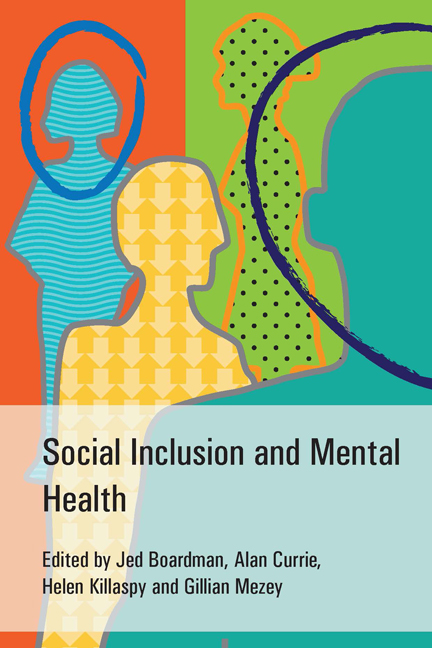Book contents
- Frontmatter
- Contents
- List of contributors
- List of tables
- Foreword
- Preface
- Acknowledgements
- Scoping Group on Social Inclusion, Royal College of Psychiatrists
- Part 1 What is social exclusion?
- Part 2 Social exclusion: the scope of the problem
- Part 3 Working towards inclusive psychiatry
- 13 Social inclusion: research and evidence-based practice
- 14 Implications of social inclusion for individual practice
- 15 Socially inclusive mental health services: what will they look like?
- 16 Training for socially inclusive practice
- 17 Community mental health and the inclusion–exclusion seesaw
- 18 Socially inclusive practice and psychiatry in the 21st century
- Index
14 - Implications of social inclusion for individual practice
from Part 3 - Working towards inclusive psychiatry
- Frontmatter
- Contents
- List of contributors
- List of tables
- Foreword
- Preface
- Acknowledgements
- Scoping Group on Social Inclusion, Royal College of Psychiatrists
- Part 1 What is social exclusion?
- Part 2 Social exclusion: the scope of the problem
- Part 3 Working towards inclusive psychiatry
- 13 Social inclusion: research and evidence-based practice
- 14 Implications of social inclusion for individual practice
- 15 Socially inclusive mental health services: what will they look like?
- 16 Training for socially inclusive practice
- 17 Community mental health and the inclusion–exclusion seesaw
- 18 Socially inclusive practice and psychiatry in the 21st century
- Index
Summary
If you can't get listened to in a ward round you don't believe that you have a chance of getting what you want in the outside world.
Pauline, service userThe preceding chapters confirm what psychiatrists already know from their daily practice – that the people they see experience exclusion and lack access to a wealth of opportunities including employment, housing and education and that this exacerbates their mental health problems.
Psychiatric training, with its long and repeated exposure to direct clinical contact and involvement in the lives of patients equips practitioners to see the importance of social disadvantage. Psychiatrists are well able to see that social disadvantages are both a cause and a consequence of mental illness (Horwitz & Scheid, 1999), that these disadvantages do not necessarily stem simply from a lack of material resources (Morgan et al, 2007), and that those with mental health problems are often excluded in multiple ways (e.g. low income, poor housing). Psychiatry has a long tradition of highlighting the disadvantages that service users face and of working to increase their control and empowerment.
To address the social exclusion experienced by users of mental health services practitioners need skills, knowledge and values that recognise not only the damaging effects of exclusion, but also the benefits of inclusion. Improving the breadth and quality of opportunities afforded not only benefits a person's mental health, it allows people to make positive contributions to their communities and to society and restores the hope for them and their families that they can adapt to the constraints that may be enforced by illness or disability.
These themes overlap significantly with the idea of recovery as applied to psychiatry (Chapter 3). Central to this is the hope that individuals can be helped and supported to define and find new roles and learn to live well even in the face of significant illness or impairment. Empowering individuals to describe their own new roles, to support them in finding or rediscovering opportunities and, where possible, equipping and allowing them to direct and manage their own care, are all important if socially inclusive practice is to become the norm (Case study 14.1). Acquiring the skills for both recovery-oriented practice and to support self-care is a necessary stepping stone for practitioners who aspire to genuine socially inclusive practice.
- Type
- Chapter
- Information
- Social Inclusion and Mental Health , pp. 295 - 310Publisher: Royal College of PsychiatristsFirst published in: 2017



